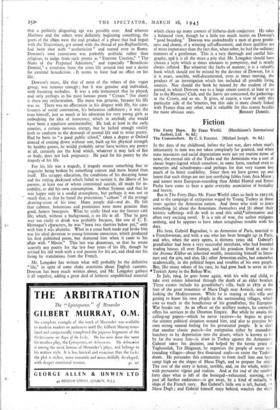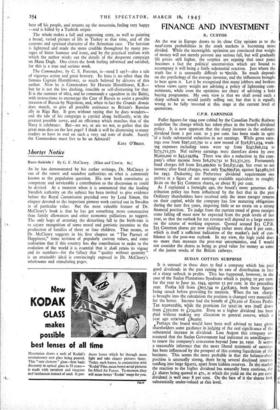Fiction
The Commodore. By C. S. Forester. (Michael Joseph. 9$. 6d.)
IN the days of my childhood, before the last war, days when man's inhumanity to man was not taken completlely for granted, and when mass massacres and-racial deportations were not yet routine items of news, the eternal tale of the Turks and the Armenians was a sort of classic bogey-legend which somehow, in some form, reached even to nurseries and schoolrooms—and perhaps for that very reason lost much of its bitter credibility. Since then we have grown up and learnt that such things are not just terrifying fables from Asia Minor ; and names more European-sounding than Abdul Hamid and Enver Pasha have come to bear a quite everyday association of bestiality and horror.
But in The Forty Days Mr. Franz Werfel takes us back to 1915-16, and to the campaign of extirpation waged by Young Turkey in those years against the Armenian nation. And those who wish to4earn something (a) about the Armenians themselves and (b) about their. historic sufferings will do well to read this solid, informative and often very exciting novel. It is a tale of woe, the author mitigates nothing, and he appears to have taken scrupulous trouble with his data.
His hero, Gabriel Bagradian, is an Armenian of Paris, married to a Frenchwoman, and with a son who has been brought up in Paris, and who, when the story opens, is thirteen yearn old. Gabriel's grandfather had been a veil] successful merchant, who had founded trading houses all over Europe, and his grandson lived at ease in the Avenue Kliber on inherited wealth, interesting himself in litera- ture and the arts, and also, like other Armenian exiles, but somewhat academically, in the political hopes and troubles of his own people. But, like many others of his race, he had gone back to serve in the • Turkish Army in the Balkan War.
In July, 1914, he goes home again, with his wife and child, to take over estates inherited through the death of an elder-brother.. These estates include his grandfather's villa, built in 1870 at the foot of the great mountain of Musa Dagh near Antioch, and over- looking the Mediterranean. While he is staying at this villa and getting to know his own people in the surrounding villages, which owe so much to the beneficence of his grandfather, the Europa!: War breaks out. As an officer on the artillery reserve, he correctly
offers his services to the Ottoman Empire. But while he awaits his calling-up papers—which he never receives—he begins to grasp
the sinister political situation around him, and also to perceive his
own strong natural feeling for his persecuted people. It is clear that another classic putsch—for extirpation either by immediat,
butchery or by deportation into the desert, which is known to tQ by far the worse fate—is afoot in Turkey against the Armenians Gabriel takes his decision, and helped by the heroic priest of
Yoghonoluk, Ter Haigasun, he organises the people of seven stir-
'rounding villages—about five thousand souls—to resist the Turkish doom. He persuades this community to form itself into one large
camp high on- the slopes of Musa Dagh, and to prepare for siege
The rest of the story is beroic, terrible, and, on the whole, written with persuasive vigour 4nd realism. And at the end of the terrible
forty days what is left of the besieged—exhausted, starving, and past all further endurance—is got away, by a kind of miracle, in ships of the French navy. But Gabriel's little son is left, buried, on Musa Dagh; and Gabriel himself stays behind, watches the shi`,1s
bear off his people, and returns up the mountain, feeling very happy —and is killed by a Turkish sniper.
The whole makes a full and engrossing story, as well as painting a broad, varied picture of life in Turkey at that time, and of the customs and spiritual character ofthe Armenian race. ' The heroism is lightened and made the more credible throughout by many pas- sages of bitter humour and irony, and by the practical realism with which the author works out the details of the desperate campaign on Musa Dagh. One closes the book feeling informed and satisfied,. for this is a true and ,serious work.
The Commodore, by C. S. Forester, is—need I say?—also a tale of vigorous action and great bravery. Its hero is no other than the famous Captain Hornblower, so much beloved by devotes of this author. Now he is Commodore Sir Horatio Homblower, K.B.- but he is not the less dashing, irascible or self-distrusting for that. It is the summer of 1812, and he commands a squadron in the Baltic, with instructions to encourage the Czar of Russia to resist a possible invasion of Russia by Napoleon, and, when in fact the Grande Armee does march, to give all possible assistance to Britain's Russian ally in Riga Bay. It goes without saying that he does wonders— and the tale of his campaign is carried along brilliantly, with the greatest possible verve, and an efficiency which matches that of the Navy it celebrates. But—are we, or are we not, to gather that the great man dies on the lastpage? I think it will be distressing to many readers to have to end on such a very sad note of doubt. Surely the Commodore must live to be an Admiral?
KATE O'BRIEN.



























 Previous page
Previous page